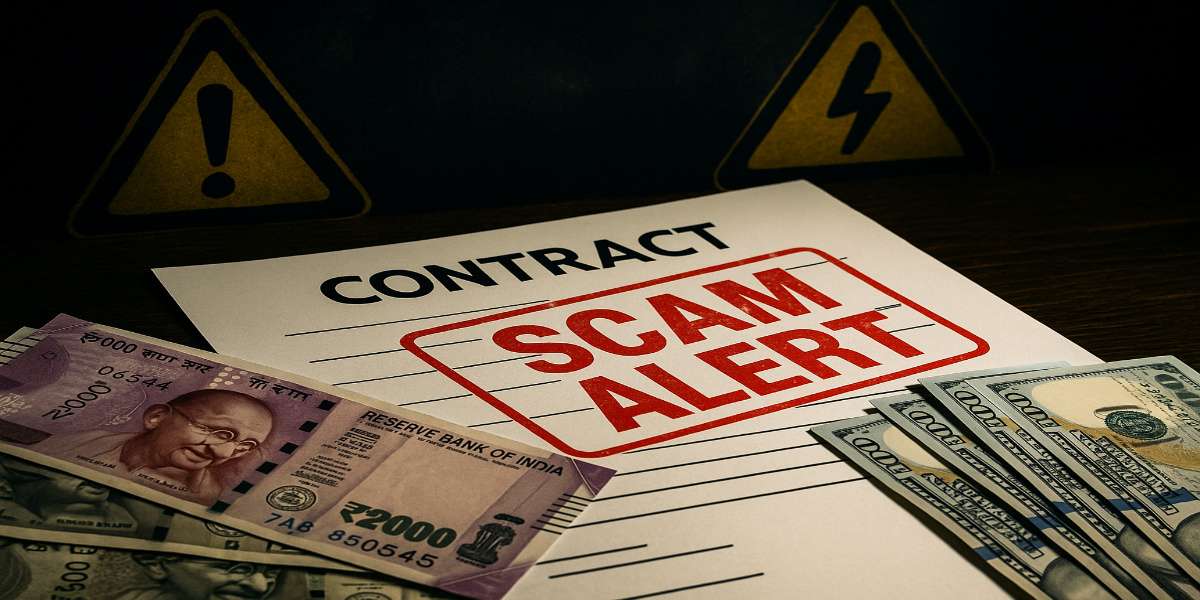Each year, Indian investors lose millions to foreign scams—a fate that could be prevented with fundamental knowledge. Whether you’re planning to invest internationally or already have money abroad, this guide is designed to help protect your savings from fraudsters.
We’ll detail the most common overseas investment scams targeting Indian investors, provide crucial pre-investment checks to safeguard your money, and outline red flags that signal potential fraud. You’ll also discover what recovery options are available if you’ve already been victimized.
Don’t risk becoming another statistic; read on to secure your international investments.
Protecting Yourself from Foreign Scams in Global Investment Markets

When investing overseas, you need to watch out for Ponzi and pyramid schemes. These scams look legitimate at first but eventually collapse, taking your money with them.
In a Ponzi scheme, scammers promise high returns but actually use new investors’ money to pay earlier investors. No real investments happen. Red flags include:
- Promises of exceptionally high returns with little to no risk
- Investments that are not officially registered with a financial authority
- Vague or overly complex investment strategies that lack clear details
- Strong encouragement or pressure to recruit new investors to the scheme
- Consistent delays or problems when you attempt to withdraw your money
You’ll often see these schemes promoted as “exclusive investment clubs” or “high-yield investment programs” targeting Indian investors specifically. If someone promises you 20-30% returns when legitimate investments yield 8-12%, your alarm bells should ring.
Identifying Fake Real Estate Opportunities
Overseas property scams target Indians looking for vacation homes or investment properties. Fraudsters show glossy brochures of properties that either don’t exist or aren’t legally for sale.
Before putting down any money:
- Search the property address online
- Verify the seller’s credentials
- Check local property registries
- Use a trusted local lawyer
- Never wire money without verification
Many Indian investors have lost money in fake Dubai, Singapore, and US property schemes. Always visit the property yourself or have a trusted representative do so.
Spotting Fraudulent Offshore Banking Offers
Offshore banking scams promise tax advantages and high interest rates, but often lead to disaster. You might receive emails offering “secret” banking opportunities in tax havens like Panama or the Cayman Islands.
Warning signs include:
- Requests for large upfront fees
- Promises of unrealistic interest rates
- Claims of absolute secrecy
- Pressure to act quickly
- Unusual payment methods
Remember, legitimate offshore banking requires proper documentation and compliance with Indian tax laws. If someone tells you their offshore account can help you “hide money” from authorities, they’re likely setting you up for both financial loss and legal trouble.
Identifying Foreign Scams in Currency Exchange Trading Platforms
Forex scams have trapped countless Indian investors. These schemes promise easy profits trading currency pairs with minimal knowledge or effort.
Protect yourself by watching for:
- Claims of ‘insider information’ or special access to market data
- Guarantees of success from automated trading systems with unbelievable track records
- Brokers who are not registered with a legitimate financial regulatory body
- Offers of free introductory training that quickly lead to high-pressure sales for costly services
- Refusal to openly discuss the significant risks involved in forex trading
Many forex scams now operate through slick mobile apps and social media. Before trading, verify the broker is registered with legitimate financial authorities. Even licensed forex trading carries significant risk—anyone promising otherwise is lying to you.
Pre-Investment Due Diligence Essentials
Before you put a single rupee into a foreign investment, do your homework on the company. Start by checking if they’re registered with their local financial regulator. For UK firms, you should look up their details on the Financial Conduct Authority (FCA) register. Similarly, US companies must be registered with either the SEC or FINRA.
Don’t just take their word for it. Request proof of their licenses and operating history. A legitimate firm won’t hesitate to provide this information. Cross-check their physical address – does it match what’s on their official documentation? Many scammers use fake addresses or virtual offices.
Call their listed phone number and ask specific questions about their regulatory compliance. If they dodge these questions or pressure you to invest immediately, walk away.
Researching Local Regulatory Frameworks
Each country has its own financial rules and protections. You need to understand what safeguards exist where you’re investing.
Countries like Singapore, the US, and UK have robust investor protection mechanisms, while others might leave you vulnerable if things go south. Find out if there’s an investor compensation scheme in that country – this acts as a safety net if the investment firm fails.
Look into:
- How complaints are handled
- What dispute resolution mechanisms exist
- The maximum compensation available if the firm collapses
Checking Cross-Border Investment Laws for Indians
As an Indian citizen, you’re bound by specific rules when investing abroad. The Liberalised Remittance Scheme (LRS), governed by FEMA regulations, permits Indian citizens to invest up to $250,000 abroad each financial year.
Remember these key points:
- All foreign investments must be declared in your tax returns
- Not all investment types are permitted under LRS
- RBI approval may be needed for certain investments
- You can’t use LRS for margin trading or speculative investments
Breaking these rules, even unknowingly, can lead to hefty penalties. Double-check with a financial advisor who specializes in cross-border investments before proceeding.
Understanding Tax Implications and Double Taxation Treaties
Your foreign investments will be taxed both abroad and in India. This is where Double Taxation Avoidance Agreements (DTAAs) become crucial.
India has DTAAs with over 80 countries to prevent you from paying tax twice on the same income. How this works varies by country and investment type:
| Investment Type | Typical Tax Implications |
|---|---|
| Stocks/Equity | Capital gains tax + dividend tax |
| Real Estate | Rental income tax + property tax |
| Fixed Deposits | Interest income tax |
You’ll need to file a Foreign Assets Schedule in your ITR and may need to complete a Form 67 for foreign tax credits. Don’t try to hide these investments – with global financial information exchange agreements, tax authorities already know about them.
Read : ITR filing for foreign income and assets: Avoid double tax
Reading Reviews and Case Studies from Fellow Indian Investors
Learn from others’ mistakes and successes. Seek out reviews and experiences from other Indians who’ve invested in the same markets or with the same firms.
Online forums like IndianMoney, Reddit’s r/IndiaInvestments, or Facebook groups dedicated to Indian investors abroad can be goldmines of information. Pay special attention to:
- How companies handled market downturns
- Customer service experiences during withdrawals
- Hidden fees that weren’t initially disclosed
- Difficulties in repatriating funds to India
Remember, even glowing reviews can be fake. Look for detailed accounts with specific information rather than vague praise. When someone shares a negative experience, check if the company responded professionally or dismissively – this tells you a lot about how they’ll treat you when issues arise.
Digital Security Measures for Overseas Transactions

Securing Online Financial Communications
When dealing with overseas investments, your digital safety starts with communication. Never discuss financial details through regular email. Instead, use encrypted messaging platforms like Signal or ProtonMail when corresponding with brokers or investment partners.
Got an urgent request asking for personal information? Always verify through a separate channel. Call your broker’s official number (not one provided in an email) to confirm any request is legitimate.
Remember that genuine financial institutions will never ask for your complete password or PIN via email or phone. If you receive such requests, it’s almost certainly a scam targeting Indian investors looking to diversify internationally.
Read : Cyber Security Best Practices by CERT-IN
Using Verified Payment Platforms and Escrow Services
Your money deserves top-tier protection when crossing borders. Only use payment platforms with solid reputations like PayPal Business, Wise, or established bank wire transfers for international transactions.
For larger investments, consider escrow services that hold your funds until all conditions are met. This creates a safety buffer between you and potential scammers.
Before sending any money, double-check the receiving account details by:
- Verifying the account through official websites
- Confirming with the company via their published contact information
- Researching if others have successfully used this payment channel
Protecting Personal and Financial Documentation
Your financial documents are gold mines for scammers. When sharing KYC documents with international platforms:
- Watermark all documents with the date and purpose (“For XYZ Investment Only”)
- Redact unnecessary information
- Use secure file-sharing services with password protection
- Never send documentation through unencrypted email
Store digital copies of your investment documents in encrypted cloud storage with strong, unique passwords. Physical documents? Keep them in a secure, locked location.
Implementing Two-Factor Authentication for All Accounts
Your password alone isn’t enough protection anymore. Enable two-factor authentication (2FA) on every financial account you own—especially those related to international investments.
Authenticator apps like Google Authenticator or Authy provide stronger security than SMS-based verification. Why? Because phone numbers can be compromised through SIM-swapping attacks.
For your most sensitive financial accounts, consider using hardware security keys like YubiKey for the strongest protection available. These physical devices must be present to access your accounts, making remote hacking nearly impossible.
When traveling abroad to meet investment partners, use VPNs on public Wi-Fi and consider bringing a dedicated device just for financial transactions.
Legal Safeguards When Investing Abroad

Consulting with Cross-Border Investment Specialists
Before you put your hard-earned money into foreign investments, talk to someone who knows the terrain. Cross-border investment specialists aren’t just nice to have—they’re essential. These experts understand the regulatory frameworks in both India and your target country.
Think about it: would you perform surgery on yourself? Probably not. So why navigate complex international investment laws alone? A good specialist will flag potential scams, explain tax implications, and identify genuine opportunities that match your risk appetite.
Creating Legally Binding Contracts with Clear Terms
Never shake hands and call it a day. When investing abroad, every agreement needs proper documentation with crystal-clear terms.
Your contracts should specifically outline:
- Investment amount and timeline
- Expected returns and payment schedule
- Exit clauses and conditions
- Penalties for breaches
- Governing law (which country’s legal system applies)
Vague contracts are a scammer’s playground. If someone resists putting details in writing, walk away immediately—they’re likely hiding something.
Understanding Dispute Resolution Mechanisms
What happens when things go south? You need to know this before investing a single rupee.
Most international investments specify either:
- Arbitration in a neutral country
- Litigation in a specific jurisdiction
- Mediation processes
Each option comes with different costs, timelines, and enforcement challenges. Push for arbitration in a neutral location with a good track record of fairness to foreign investors.
Documenting All Transactions and Communications
Paper trails save lives—or at least your money. Keep records of:
- All emails and messages
- Phone call summaries (follow up important calls with confirmation emails)
- Payment receipts and transfer confirmations
- Meeting notes
- Changes to agreements
Screenshots of online portals showing your investments are crucial too. These documents become your lifeline if you need to prove fraud or misrepresentation.
Knowing Your Rights as a Foreign Investor
Many countries offer specific protections to foreign investors, but you can’t claim rights you don’t know about.
Research whether your target country has:
- Bilateral Investment Treaties with India
- Foreign investor protection laws
- Repatriation guarantees for your profits
- Anti-fraud mechanisms specific to foreign investments
The Indian government’s investment advisories can provide valuable information about countries with concerning fraud patterns. Check the Ministry of External Affairs website regularly for updated warnings.
Red Flags That Signal Potential Fraud

Promises of Guaranteed High Returns
Ever noticed how these fraudulent schemes always promise you returns that seem too good to be true? That’s because they are. If a scheme guarantees returns of 20%, 30%, or even 50% with ‘zero risk,’ you should be extremely cautious. All legitimate investments carry some level of risk, and their returns are generally in line with established market standards.
You’ll often see these scammers using phrases like “guaranteed returns,” “risk-free investment,” or “double your money.” They might claim to have “secret” investment strategies that somehow the entire financial industry has missed. Trust your gut—if it sounds unrealistic, it probably is.
Pressure Tactics and Artificial Time Constraints
Be wary of pressure tactics and artificial deadlines like ‘Only 2 spots left!’ or ‘Offer expires in 24 hours!’ These methods are designed to create a false sense of urgency, forcing you to make a quick decision without the time to research or consult with others. Scammers pressure you to act immediately, suggesting that hesitation will lead to a lost opportunity.
Remember, a genuine investment opportunity will not vanish overnight. Always take your time, conduct thorough research, and never allow anyone to rush you into making a financial decision.
Vague Business Models and Investment Strategies
When you ask how exactly your money will generate returns, do you get clear answers or vague explanations filled with jargon? Fraudsters typically hide behind complex terminology and unclear business models.
You deserve transparent explanations about where your money is going and how it will grow. If someone can’t clearly explain their investment strategy in terms you understand, or if they become defensive when questioned, consider it a major warning sign.
Limited or No Direct Contact Information
Try finding reliable contact information for the company. Legitimate firms provide physical addresses, regulated phone numbers, and official email addresses. Scammers often limit communication to WhatsApp, Telegram, or generic email addresses.
You should always be able to verify a company’s existence through official channels. If their website lacks a physical address, has no registration information, or offers only mobile numbers and messaging apps for contact, proceed with extreme caution. Your ability to reach someone when problems arise is crucial for any investment you make.
Recovery Options When Things Go Wrong
Reporting to Indian Financial Authorities
When you’ve been scammed, acting fast matters. Report the fraud immediately to Indian financial watchdogs. The Securities and Exchange Board of India (SEBI) has a dedicated complaint portal where you can file detailed reports about investment scams. The Reserve Bank of India (RBI) also accepts complaints related to banking frauds.
Don’t forget about local police – file an FIR at your nearest station and specifically ask for it to be forwarded to the Cyber Crime Cell if the scam happened online. The Economic Offences Wing handles larger financial frauds, so approach them if your case involves substantial money.
Read : Cyber Crime Reporting Portal (India)
Engaging with Foreign Regulatory Bodies
Dealing with scammers abroad? You’ll need to contact foreign regulators directly. For US-based scams, reach out to the SEC or FINRA. In the UK, the Financial Conduct Authority (FCA) is your go-to.
Most countries have online complaint forms specifically for international victims. Gather all your evidence before filing – transaction records, screenshots of communications, and any promises made by the scammers. Remember that these agencies won’t typically recover your money, but they can help shut down the operation.
Legal Recourse Options Across Borders
Cross-border legal action is tough but possible. You might want to consult with a lawyer who specializes in international financial law. Sometimes, hiring local legal representation in the scammer’s country works better than trying to fight from India.
Class action lawsuits can be powerful if you connect with other victims. Look for online forums where scam victims gather – you might find strength in numbers. Just know that international legal proceedings can take years and cost significant money.
Working with Specialized Fraud Recovery Services
Several legitimate companies specialize in recovering funds from international scams. They employ forensic accountants, cybersecurity experts, and lawyers who understand how to track money across borders.
Be careful though – the recovery space is itself filled with secondary scammers who promise to get your money back… for an upfront fee. Never pay large advance fees. Legitimate recovery services typically work on contingency or charge modest initial consultation fees.
A good recovery service should provide references and have a proven track record. Check their credentials thoroughly before proceeding.
Learning from Mistakes for Future Investments
Turn your painful experience into valuable wisdom. Create a personal investment checklist that includes verifying regulatory licenses, conducting thorough background checks, and never rushing into decisions based on FOMO.
Start small with any new investment platform. Test the withdrawal process early – legitimate platforms make withdrawing money straightforward. Join investment communities where experiences are shared openly, both good and bad.
Consider working with a registered Indian financial advisor who understands international markets but operates under Indian regulations. They can help you access global opportunities without the extreme risks you’ve faced.
The global investment landscape presents numerous opportunities, but as our exploration has shown, it also harbors significant risks that have trapped 90% of Indian investors. From identifying common overseas scams to implementing robust digital security measures, conducting thorough due diligence, and recognizing warning signs, protecting your hard-earned money requires vigilance and knowledge. The legal safeguards and recovery options we’ve discussed provide essential backup strategies when preventive measures fail.
Arm yourself with information before sending your capital abroad. Remember that legitimate investment opportunities never demand urgent action or promise unrealistic returns. By applying the protective strategies outlined in this article, you can position yourself among the cautious 10% of Indian investors who successfully navigate international investments while keeping their assets secure. Your financial future is too important to leave vulnerable to sophisticated international scammers.
Disclaimer : This article is for educational purposes only and does not constitute financial, legal, or investment advice. Readers should verify all information with official sources and consult qualified professionals before making any overseas investments. The author and publisher are not responsible for any losses or damages arising from the use of this content.


